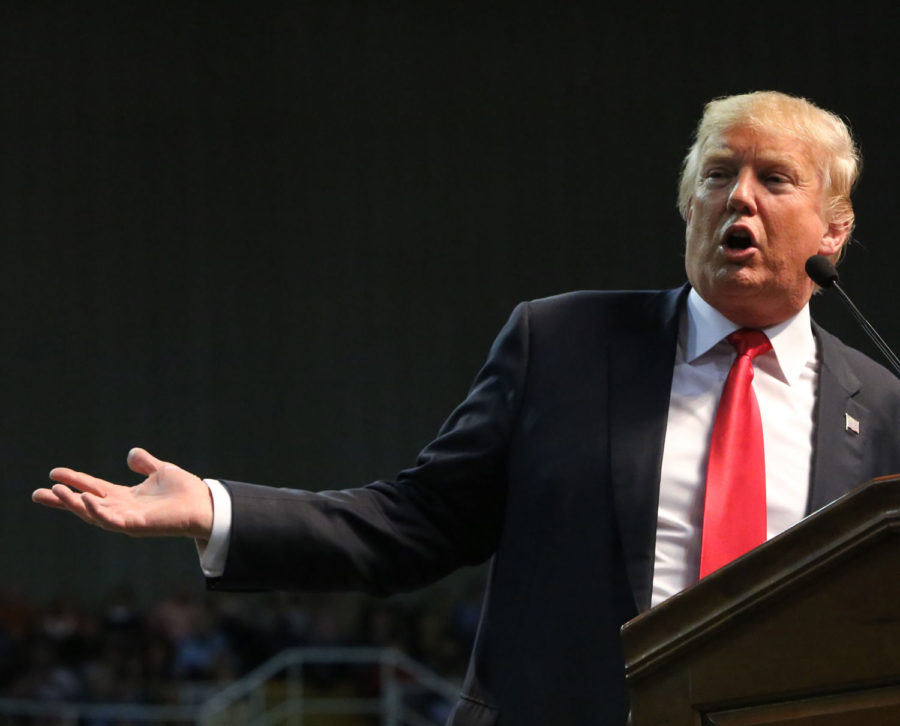Convention fight has risks for GOP
March 19, 2016
In the longest and wildest political convention in American history, it took Democratic delegates 103 rounds of voting over 17 days in 1924 in New York’s Madison Square Garden before John W. Davis captured the nomination.
It’s doubtful that 103 roll calls will ever be matched, but there is a real possibility that Americans this year could see the first contested political convention in more than six decades.
A contested convention — when no candidate has a majority of delegates going in — is Ohio Gov. John Kasich’s only possible path to the GOP presidential nomination and it is one that could spark a major schism in the Republican Party.
Advertisement
Beyond that, Republican front-runner Donald Trump told CNN last week that if he were close to the 1,237 required delegates but denied the nomination: “I think you’d have riots.”
“If you disenfranchise those people, and you say, ‘I’m sorry, you’re 100 votes short’ … I think you’d have problems like you’ve never seen before,” Trump told CNN host Chris Cuomo. “I think bad things would happen.”
The remark drew rebukes, including from Kasich and U.S. House Speaker Paul Ryan, but there is little question that Trump supporters will be unhappy if he comes close only to have the nomination handed to someone who earned fewer delegates or — one scenario being mentioned — did not even participate in the primary process.
If no candidate has 1,237 delegates going into the RNC convention in Cleveland, it could trigger multiple rounds of voting until a nominee is selected.
Sandwiched between each round would be politicking by delegates, pols, campaign honchos and party officials from hundreds of counties and congressional districts across America.
Bound delegates could become “free agents” able to back other candidates at different stages, depending on their state.
“It’s going to be a street fight,” said Daniel Tokaji, Ohio State University law professor who is an expert on elections law.
Advertisement*
Risky business
As a civics lesson a contested convention could be a valuable exercise for the country, but for the party involved it is fraught with risks.
Trump has led the GOP race for the entire primary season, and currently has 678 delegates, according to a delegate count from realclearpolitics.com. He would need to win about 59 percent of the outstanding delegates to sew up the nomination before Cleveland.
Turning to someone other than Trump — particularly if he is on the doorstep — could alienate huge numbers of voters and possibly push some to sit out the election or even vote for the Democrat, most likely Hillary Clinton.
Some also fear that if the GOP rejects Trump, he’ll run as a third-party candidate, causing more intra-party spats.
“If Trump is reasonably close to the 1,237, yet there is an attempt to block his nomination, that would be extremely divisive, I believe, with respect to Trump supporters,” said former Ohio Gov. Bob Taft, a political science lecturer at the University of Dayton.
On the other hand, said Taft, if Trump does capture the nomination, “there could be substantial slippage” in Republican voters willing to support him.
Tough spot
The Taft family has had some experience with tumultuous conventions. The 1912 Republican convention featured a bitter battle between President William Howard Taft — Bob Taft’s great-grandfather — and former president Theodore Roosevelt.
When Taft won the GOP nomination, a furious Roosevelt formed the Progressive Party, which nominated him as their candidate for president.
Both Roosevelt and Taft were drubbed in the November election, which was won by the Democrat Woodrow Wilson.
Forty years later, Bob Taft’s grandfather, U.S. Sen. Robert A. Taft Sr., was outmaneuvered at the 1952 Republican convention in Chicago by former General Dwight D. Eisenhower. That time Republicans went on to win in November.
The popularity of Trump combined with the polarizing nature of his candidacy puts Republicans in a tough spot, said Kyle Kondik of the University of Virginia Center for Politics.
“In addition to likely protests in Cleveland, we could see a small but significant number of Republicans decline to vote,” he said. “In an era where each party needs 90 percent-plus support or so from their core supporters, any falloff from Republicans could prove fatal in the general election.”
All the possible chaos seems to run counter to what the conventions in recent years have become. They are run by the parties and often used, or at least planned, as a showcase for a unified party that can carry that momentum into the fall campaign.
Researching strategies
Contested conventions have happened 10 times for the Republicans and 16 times for the Democrats, though not since 1952, when Adlai Stevenson won the Democratic nomination on the third round, according to Congressional Quarterly’s Guide to U.S. Elections.
The last contested Republican convention was 1948, when it took three rounds of voting for Thomas Dewey to capture the GOP nomination.
In 1976, Ronald Reagan challenged incumbent President Gerald Ford but only one round of delegate voting took place.
The campaigns still in the running this year are already researching scenarios and strategies for a contested convention.
And unlike Ohio, where delegates are named by the campaigns at the outset, most state parties will pick their delegates at state conventions in April and May — a possible factor if the nominating process goes past the first ballot in Cleveland.
It’s unclear what impact this will have, but Kondik said it is worth noting in most cases the actual delegates — the people who cast their votes at the convention — weren’t selected by the person to whom they are bound.
If the nominating process goes to multiple ballots, those delegates who aren’t committed to a candidate may be more inclined to move their support, he said.
“The Cruz campaign, in particular, seems to understand this, and they may be working behind the scenes to get sympathetic delegates into position who can flip to them in the event of a second or third or fourth ballot,” he said. “I would suspect that much of the action would take place behind the scenes, but keep in mind: For almost all modern observers and participants, this will be uncharted territory, if it happens.”
Another key factor will be who sits on the Republican convention rules committee, which has more than 100 members, and whether it is stacked with Trump or Cruz supporters or others, Taft said.
The rules committee makes and changes convention rules, such as whether a candidate must have placed first in at least eight states to be considered for the nomination.
But Taft cautioned: “It’s too early to tell because we don’t know what’s going to happen. Cruz could pick up steam. Kasich could pick up a state or two. Trump could run the tables.”
Trump still in driver’s seat
Most people still believe Trump is in the driver’s seat. A Rasmussen Reports survey finds that 80 percent of likely Republican voters believe Trump will be the GOP nominee and three-quarters of all likely voters think so.
Tokaji believes the stakes could go beyond the outcome of the election in November.
“I think there is a good chance that no matter how this shakes out, the Republican coalition will fray, if not disintegrate,” he said. “What it could mean is the beginning of something that happens only about every half century, which is a major realignment of a political party.”
___
(c)2016 the Dayton Daily News (Dayton, Ohio)
Visit the Dayton Daily News (Dayton, Ohio) at www.daytondailynews.com
Distributed by Tribune Content Agency, LLC.
Advertisement









